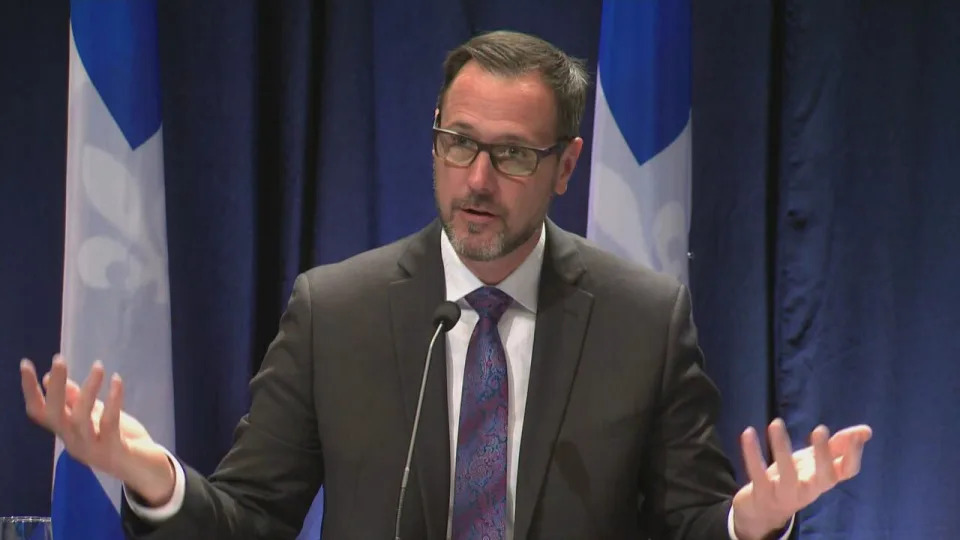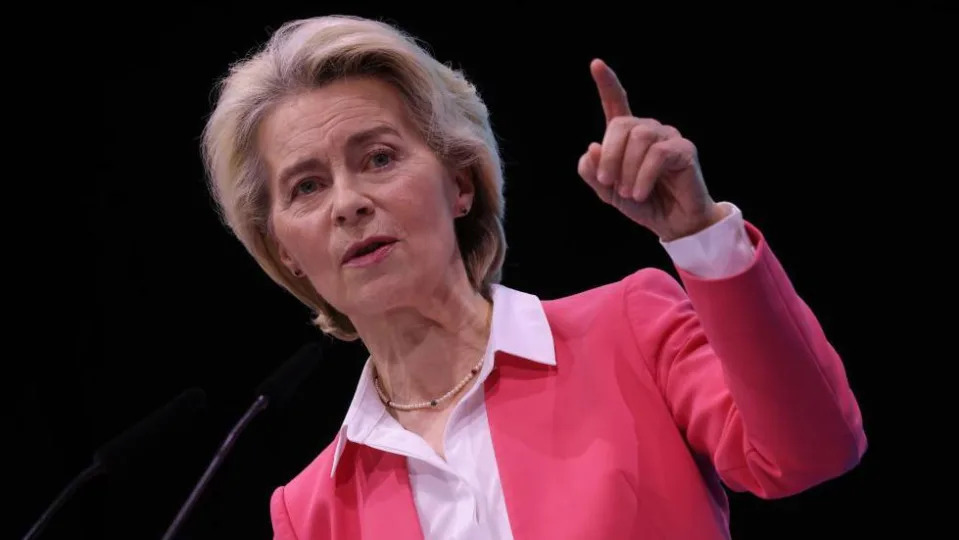Tue, June 11, 2024

Prime Minister Justin Trudeau attends a bilateral meeting with Quebec Premier Francois Legault in Montreal on March 15, 2024. The government of Canada is tracking U.S. concerns about Quebec's new language law, a federal official confirmed.
U.S government officials have discussed behind closed doors the possibility of imposing trade sanctions on Canada over Quebec's controversial Bill 96 language law, CBC News has learned.
Documents obtained by CBC News under the U.S. freedom of information law also reveal that American government officials are being told that the implementation of Bill 96 could result in fewer American products being shipped to Canada — not just to Quebec.
According to the documents, officials from the Office of the U.S. Trade Representative (USTR) have debated whether the legislation — which includes provisions that could affect things like commercial signs, trademarks and labels on products — contravenes trade agreements between Canada and the United States.
U.S. officials have discussed in private whether the restrictions in Bill 96 constitute a technical barrier to trade, a breach of trade-related intellectual property rights or a violation of Section 301 of the Trade Act of 1974, and whether those breaches would justify trade sanctions.
The documents, which cover the period of November 2022 to late January 2024, don't reveal whether USTR officials have reached a conclusion on trade sanctions.
Asked for an update, USTR deputy press secretary Catherine White pointed to the readout of a meeting between Canadian and American trade officials in January, which mentions U.S. government concerns about Bill 96.
Jean-Pierre Godbout, spokesperson for Global Affairs, said the Canadian government is "closely following developments."
"The Government of Canada is aware of the concerns expressed by various stakeholders regarding Quebec's amendments to the Charter of the French Language as modernized under Bill 96 and accompanying regulations," Godbout wrote in an e-mailed response. "We have shared these concerns with the Government of Quebec and continue to closely follow developments."

Quebec Education Minister Jean-François Roberge said Wednesday was a 'great day' because he was announcing a possible return to normality for students in September.
Quebec Language Minister Jean-François Roberge is preparing the final regulations for Bill 96. (Radio-Canada)
Thomas Verville, spokesperson for provincial French Language Minister Jean-François Roberge, gave little indication of what the Quebec government thinks of the USTR's internal discussions of trade sanctions.
"We are still at the stage of enacting the regulation. It will soon be final," he wrote. "We held a consultation period to gather all the comments."
Bill 96, which tightens up Quebec's language laws, was given final assent on June 1, 2022 and draft regulations to implement the legislation were made public on Jan. 10, 2024. The final regulations to implement Bill 96 are expected to be made public in coming weeks.
A number of provisions of Bill 96, including those on trademarks, are set to go into effect in June 2025.
Bill 96 was among the subjects raised by American officials during a Jan. 24 meeting between USTR senior adviser Cara Morrow and her Canadian counterpart Rob Stewart, deputy minister for international trade.
Industry pressing Washington for action
In its readout from the meeting, the USTR's office said Morrow "shared concerns about trademark provisions of Quebec's Bill 96 and their potential implications for U.S businesses, including small and medium-sized enterprises."
The documents obtained by CBC News show that Bill 96 has been on the U.S government's radar since at least November 2022, and the International Trademark Association (INTA) has been urging the U.S. government to raise their concerns about Bill 96 with the Canadian government and to consider trade sanctions against Canada.
On Dec. 12, 2023, INTA organized a meeting between USTR officials, including Morrow, and executives from several large corporations who outlined their concerns with Bill 96. The companies included Stanley Black & Decker, Hershey, Microsoft, Marriott, Agilent Technology, Cody and Proctor & Gamble.

The Microsoft logo is pictured at the Mobile World Congress 2023 in Barcelona, Spain, on March 2, 2023. Microsoft and Meta have released initiatives designed to help voters know when they see a political ad containing altered images, video or audio. Meta owns Facebook and Instagram and says it will put labels on political ads created using artificial intelligence.
Microsoft is one of the major American multinationals with concerns about Bill 96. (Joan Mateu Parra/The Associated Press)
"Of note, they want USTR to investigate 'a complaint for a violation of an international agreement' or bring a Section 301 action against Canada," wrote deputy assistant U.S. trade representative Jacob Ewerdt.
In e-mail exchanges and briefing notes, INTA's director of government relations Jenny Simmons wrote that even if U.S. companies want to register their trademarks in Canada before Bill 96's provisions take effect in 2025, they can't because the Canadian Intellectual Property Office — which registers trademarks in Canada — has a four-year backlog of applications.
In a separate document, a coalition of "businesses, practitioners and trade associations" warned the U.S. government that Bill 96 could affect the products available in Canada.
"The Quebec consumer is who will be hurt, as they will either be deprived of goods available to others or will pay higher prices to recoup compliance cost," the document says.
"In some instances, where distribution models are more national, withdrawing from Quebec may also mean withdrawing from Canada entirely. As a result, consumers in other provinces may also see fewer options on their shelves."

People take part in a protest against Bill 96 in Montreal on May 26, 2022. A Quebec Superior Court judge has temporarily struck down two articles of the province's new language law, saying they could prevent some English-speaking organizations from accessing justice through the courts.
(Graham Hughes/The Canadian Press)
USTR officials pointed out that while Canada is responsible for trade agreements, Bill 96 is a provincial law.
"A complicating factor is that our counterparts are federal and Bill 96 is Quebecian [sic]," Ewerdt wrote to Simmons on Dec. 14, 2023. "It is as if Canada would come to the USTR with a law in Wisconsin — we could figure it out if needed, but it's not something that we commonly deal with."
Simmons suggested that pressure from Washington could force the Canadian government to act.
"I appreciate that this is a provincial issue," she wrote. "But given that it puts Canada in a position of noncompliance with various international obligations, and directly impacts U.S. exports to all of Canada, I think that the federal gov't has no choice but to deal with this, especially if pressured by the U.S."
Another USTR official, Jennifer Stradtman, suggested she was skeptical about the chances of bringing trade sanctions to bear.
"There is no obligation in the WTO about language use," she wrote on Dec. 19. "I can't see raising an issue in TBT [technical barriers to trade] because a different language is required. Sometimes we ask for stickering in that case, but we don't claim a trade violation or request dispute."
There was no mention of trade sanctions in the USTR's talking points for the January meeting with Canadian officials, but concerns about Bill 96 were included.
"U.S companies that sell products and services in Canada are generally supportive of Quebec's Charter of the French Language, but some of the amendments threaten to seriously limit some trademarked products and services in Quebec, and potentially all of Canada," says the briefing memorandum for that meeting.
Simmons told CBC News that INTA is continuing to talk with U.S. government officials about its concerns but it does not know if the USTR will support its call for trade sanctions.
"To date, I have not heard one way or the other what the thinking is of USTR," she said. "They remain engaged, which we're very grateful for."
Simmons said INTA has been meeting in recent months with Quebec government officials and is waiting to see if its concerns are addressed in the final regulations.
Mark Warner, who practises international business law, said Bill 96 hadn't been on his radar as a potential trade conflict with the U.S.
While Warner said he believes Bill 96 is low on the list of frequent Canada-U.S trade irritants, such as automobile rules of origin and softwood lumber, it's still something Canada should keep an eye on.
"I don't think it's a priority to [the U.S.] right now but I would think it is something that you would want to watch," he said.
Eliane Ellbogen, an expert in trademark law in the Montreal office of the law firm Fasken, said Bill 96 presents a number of problems for businesses with trademarks. She said its provisions conflict with federal trademarks law and Fasken is studying a possible constitutional challenge.












